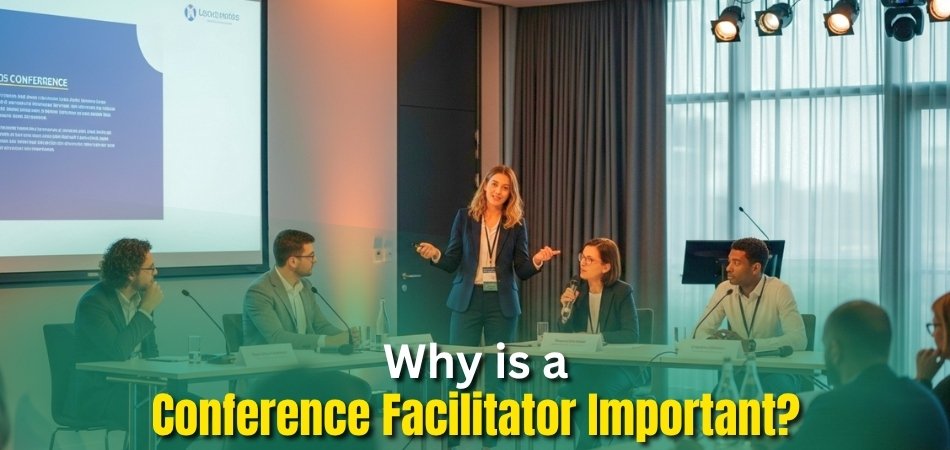Conferences are more than just scheduled talks; they’re opportunities for people to share knowledge, connect, and build solutions together. But without the right guidance, even a well-planned event can feel rushed or unbalanced. This is where a skilled facilitator makes all the difference.
They guide the flow, create space for every voice, and ensure discussions stay clear and meaningful. So, if you were wondering why is a conference facilitator important, you came to the right place.
A conference facilitator is important because they help the event run well and on time. They make sure everyone gets a chance to speak and learn. They keep talks clear, support questions, and help people connect. Their work creates a friendly space where ideas can be shared and problems are solved.
Keep reading to discover exactly how their role shapes successful conferences.
Why is a Conference Facilitator Important?
Conferences are about more than scheduled speeches; they create opportunities for learning, collaboration, and valuable connections. A skilled facilitator ensures these events run smoothly and participants leave with clear insights. Here are a few key reasons why facilitators are essential to a successful and engaging conference.
Enhancing Participant Engagement and Interaction
- Facilitators invite active involvement, motivating attendees to share ideas openly while building genuine curiosity and valuable understanding.
- They guide conversations carefully, ensuring dialogue remains inclusive while preventing dominating voices from taking over shared discussions.
- Engaged participants contribute energy, keeping sessions lively and dynamic while ensuring audiences remain attentive throughout the program.
- Interaction grows stronger through facilitated icebreakers and group activities, helping individuals bond quickly and exchange knowledge effectively.
Managing Time with Precision
- Every speaker receives equal opportunity, and facilitators keep strict timing so that no session overruns disrupt the broader schedule.
- With effective time guidance, participants enjoy a smooth rhythm that maintains focus while preventing unnecessary delays and confusion.
- Proper pacing improves concentration, allowing audiences to follow complex ideas easily without losing interest during lengthy presentations.
- Speakers also feel confident, knowing their messages will reach the audience without being overshadowed by time management problems.
Promoting Knowledge Sharing and Clarity
- Facilitators summarize essential points clearly, making sure audiences leave with actionable insights rather than vague, incomplete messages.
- They encourage questions after every session, giving attendees clarity on difficult ideas and reinforcing deeper learning through active discussion.
- Information flows smoothly when facilitators connect speakers’ points, helping attendees link concepts and create meaningful knowledge frameworks.
- They reduce misunderstandings by maintaining focus, supporting both presenters and participants in exchanging information without unnecessary confusion.
Building Networking and Professional Relationships
- Facilitators organize spaces where individuals connect, leading to collaborations that often extend beyond the event into future projects.
- Networking opportunities flourish when facilitators encourage introductions, making interactions comfortable and breaking barriers between professionals.
- Attendees meet like-minded peers, exchange practical ideas, and strengthen career opportunities through facilitated professional networking sessions.
- Long-term relationships emerge naturally, providing professionals with ongoing support systems that continue benefiting them well after conferences.
Keeping Discussions Focused and Conflict-Free
- Skilled facilitators redirect conversations when topics wander, ensuring sessions remain meaningful without wasting time on irrelevant details.
- They handle disagreements tactfully, allowing differing views to be shared while preventing unnecessary arguments from escalating.
- Focused dialogue supports collective learning, helping participants stay aligned and engaged while absorbing the most important insights.
- Balanced moderation creates harmony, enabling participants to feel respected and comfortable even during challenging or controversial discussions.
Creating an Inclusive and Respectful Environment
- Facilitators ensure marginalized voices are represented, giving every attendee confidence to share contributions without hesitation or exclusion.
- Inclusivity brings diversity of ideas, which strengthens discussions and creates richer problem-solving across various professional backgrounds.
- They respect cultural differences, helping global participants feel comfortable while interacting in international conferences with varied traditions.
- Inclusive moderation encourages fairness, allowing attendees from different backgrounds to connect equally and participate meaningfully throughout sessions.
When considering large events, countries like the United States, Germany, Singapore, and Canada frequently host international gatherings. For instance, a conference in USA often attracts diverse professionals who benefit from facilitators ensuring smooth sessions, balanced discussions, and strong networking opportunities. Similarly, other countries with vibrant conference cultures rely on facilitators to guarantee effective outcomes and lasting professional connections.
Ways to Choose the Right Conference Facilitator
Big events need someone who can keep everything running smoothly without causing stress or confusion. People often remember events not only for the talks but also for how organized and enjoyable they felt overall. A good facilitator makes sure everyone gets time to share ideas. Here are some effective ways to choose the right one.
Experience
Always look at how much experience the facilitator has in handling conferences. Someone with past practice knows what to expect and how to handle common issues. Experience also gives them the confidence to manage both small and large groups easily. When you check experience, you get an idea of how they will perform.
Communication
Clear communication is one of the most important things to look for. A facilitator who speaks well makes the event easy to follow. Good communication also helps everyone feel included and connected during the conference. Without it, people may lose interest quickly.
Listening
A great facilitator is not just a speaker but also a good listener. They pay attention when people share their thoughts or concerns. Listening helps them understand what the audience really needs. This way, the event feels more meaningful for everyone.
Time Skills
Time management is something you cannot ignore. The right facilitator knows how to keep things on schedule. They make sure sessions start and finish at the right time. This keeps participants engaged without feeling rushed or bored.
Friendly Nature
A facilitator with a friendly attitude makes everyone comfortable. People feel more open to asking questions and joining discussions. A warm smile or calm tone can change the whole environment. It helps the audience relax and enjoy the event.
Problem Solving
Sometimes, unexpected issues come up during conferences. A good facilitator knows how to fix problems quickly and calmly. Their quick thinking ensures the event continues smoothly without major interruptions. Problem-solving skills show how reliable the facilitator really is.
Inclusiveness
The best facilitators make sure every voice gets heard. They encourage shy people to share their thoughts too. Inclusiveness creates balance in discussions and keeps the conference lively. Everyone feels valued, which makes the event more successful and enjoyable.
What Are Common Facilitation Techniques for Conferences?
Conferences bring people together to share knowledge, ideas, and fresh perspectives on many different topics. The way these events are handled plays a big role in how successful they feel. People enjoy conferences more when they run smoothly without unnecessary stress or confusion. Here are some of the most effective facilitation techniques that make conferences more engaging and memorable.
Icebreakers
Starting with icebreakers helps people feel more comfortable. These simple activities let participants relax and connect quickly. They can be small games, fun questions, or group introductions. When people laugh or smile, it sets the right tone for the event.
Group Discussions
Facilitators often divide participants into smaller groups for discussions. This makes sharing ideas easier and less intimidating. Smaller groups encourage more voices to be heard. People usually feel freer to speak when the group size feels manageable.
Q&A Sessions
Question-and-answer sessions are great for interaction. They give the audience a chance to clear doubts directly. These sessions also build trust between speakers and participants. When handled well, they keep the event engaging and full of learning.
Visual Tools
Charts, slides, and simple graphics often make presentations more interesting. Visual tools help explain complex points in an easier way. They also keep the audience attentive because they add variety. People often remember pictures better than just plain spoken words.
Interactive Activities
Some facilitators plan quick activities during breaks to keep the energy high. Activities can include polls, quizzes, or short brainstorming tasks. These fun moments refresh the participants and spark more interest. They also break the monotony of long sessions.
Conflict Handling
Conflicts can arise when opinions clash during discussions. A good facilitator knows how to calm situations quickly. They guide conversations back on track without ignoring differing views. This keeps the event respectful and balanced for everyone involved.
Learning to Facilitate
Many people become curious about how facilitators actually learn their craft. Skills like managing groups, handling questions, and maintaining energy come with practice. Those interested in becoming a conference facilitator often start by watching experienced ones in action. With time, practice helps them develop confidence to lead bigger events.
How Much Does Hiring a Professional Facilitator Cost?
The price of hiring a professional conference facilitator in 2025 can vary quite a lot. Hourly rates can be anywhere from $50 to $350, depending on their skills and event complexity. A half-day workshop may cost between $300 and $1,500, while a full day can reach $3,000 or more. Multi-day or high-level events may reach $5,000 and beyond, with veteran experts charging as high as $30,000. Here are the factors that affect the cost of hiring a professional facilitator:
Experience Level
Facilitators with strong professional backgrounds often charge higher because their proven skills add unmatched event quality. Experienced individuals bring reliability and confidence, helping clients feel assured about smoother sessions. More years in the field usually translate into higher overall prices. Choosing the right level of experience depends entirely on your event’s specific goals.
Event Duration
Shorter events cost less since the facilitator spends fewer hours preparing and presenting. Half-day sessions often fit smaller groups with lighter schedules. Full-day workshops are longer, more demanding, and therefore priced higher. Multi-day events need greater planning, resulting in a much larger total bill.
Event Scope
Simple conferences usually cost less, while bigger ones with multiple sessions often need more expertise. Broader events demand more coordination, longer preparation, and extra support. Scope directly impacts how much effort facilitators must invest. The bigger the scope, the higher the expected fees.
Special Expertise
Facilitators with niche skills often charge more because their knowledge is harder to find. Professionals with backgrounds like executive leadership or technical fields are especially valuable. Their advanced understanding helps them handle complex conference topics confidently. These rare skills naturally increase their overall market rates.
Strategic Importance
Events that influence important business decisions may cost more since the stakes are higher. Facilitators leading such conferences usually require advanced preparation. Strategic gatherings demand clear focus, experienced guidance, and thorough planning. High-value results often justify larger fees for critical professional meetings.
Travel Expenses
If a facilitator travels to your event, costs increase with flights, hotels, and meals. Distance impacts overall pricing, making nearby professionals less expensive. International conferences can add significant extra charges. Travel always adds more to the total facilitator fee.
Preparation Time
Preparation often requires research, custom session design, and detailed planning. Extra time spent before the event increases the cost. Facilitators invest in making the sessions meaningful. More preparation always reflects in the final overall fee charged.
How Can a Facilitator Improve Participant Engagement?
Conferences bring people together with different ideas, and keeping them engaged can sometimes be a real challenge. When participants feel included, they become more active and willing to share their thoughts with confidence. Here are some practical ways facilitators can boost engagement and make every session more meaningful.
Interactive Questions
Asking questions during sessions keeps the audience involved and alert. It also helps participants connect ideas with real-life situations. A facilitator can mix open-ended and short questions to maintain variety. This technique ensures discussions stay lively and engaging.
Group Work
Small group activities make sharing thoughts easier for shy participants. People feel more confident speaking in smaller settings. These discussions help bring fresh perspectives into the larger conversation. Group work often makes sessions more enjoyable and memorable for everyone.
Use of Stories
Telling short stories or examples makes complicated topics simple to understand. People often remember stories longer than plain facts. A story connects emotions with information, making the learning stick. This method helps participants feel more connected with the speaker.
Active Listening
Facilitators who listen carefully show respect for participants’ voices. Attendees feel valued when their opinions are taken seriously. Listening also helps the facilitator respond better to questions. This builds trust and encourages more people to join the conversation.
Fun Activities
Adding light activities between sessions can refresh participants’ minds. Simple games, polls, or quizzes make the atmosphere more relaxed. Breaks with activities stop people from feeling tired. They help bring back focus for the next discussion.
Clear Summaries
Facilitators often summarize points after discussions to keep everyone on track. Clear summaries highlight important details without confusion. This ensures no one misses key lessons. It also helps participants organize ideas better in their minds.
Learning to Facilitate
Improving engagement depends on practice, confidence, and strong communication habits. Many of these come from understanding the skills required for conference facilitator, such as listening, managing time, and encouraging participation. Learning these skills allows facilitators to guide sessions smoothly. With time, they can master techniques that keep participants truly involved.
What Metrics Measure Facilitation Success at Events?
Events are more successful when participants feel engaged and satisfied with their overall experience. Measuring success helps organizers improve future sessions. Different metrics give a clear picture of how well the facilitator guided the conference. These indicators highlight the quality of interaction, learning, and connections made during the event.
- Participant Engagement: Active involvement shows how participants enjoyed the sessions, shared their ideas freely, and stayed focused throughout the program.
- Time Management: Sessions that begin and end as planned demonstrate efficiency, while also keeping participants attentive without unnecessary breaks or delays.
- Learning Outcomes: When attendees clearly understand the topics, gain new insights, and leave with useful knowledge, facilitation is seen as effective.
- Interaction Quality: Balanced discussions, equal participation, and meaningful questions during the event show that facilitators kept everyone connected and included fairly.
- Networking Growth: New professional relationships formed during events highlight a facilitator’s role in encouraging participants to build lasting, valuable connections.
- Conflict Handling: Quickly resolving disagreements without tension proves a facilitator’s skill in guiding discussions while keeping the environment comfortable.
- Feedback Scores: Positive comments, high ratings, and useful suggestions from participants reflect the facilitator’s success in meeting audience expectations.
FAQs about the Significance of a Conference Facilitator
Conferences are busy spaces where ideas flow and people connect. A facilitator ensures these gatherings stay organized, balanced, and productive. Below are some common questions that highlight why their role is so valuable in shaping successful events.
How Does a Facilitator Support Speakers?
Facilitators help speakers stay on schedule, manage questions, and deliver messages clearly. They provide support by creating a smooth flow between sessions, ensuring audiences understand key points, and making presenters feel confident throughout their time on stage.
Why Do Facilitators Improve Learning?
Facilitators use methods like summaries, discussions, and interactive questions to help people understand complex ideas. They make learning more engaging, ensuring participants absorb information easily and retain knowledge beyond the event, which strengthens the value of attending conferences.
Can a Facilitator Reduce Stress At Events?
Yes, facilitators lower stress by handling timing, logistics, and participant concerns. Their organized guidance allows speakers and attendees to focus on learning and connections. This creates a more relaxed environment, making the event enjoyable instead of overwhelming or rushed.
How Do Facilitators Encourage Inclusivity?
Facilitators ensure every voice is heard by encouraging quieter participants and balancing dominant speakers. They create a fair atmosphere where ideas from different backgrounds are respected. This inclusivity leads to richer discussions and stronger outcomes during conference sessions and activities.
What Role Do Facilitators Play in Networking?
Facilitators design activities that encourage meaningful conversations between participants. By guiding introductions and creating open spaces for interaction, they help people connect easily. Networking becomes more effective, leading to professional relationships that last well beyond the conference itself.
How Do Facilitators Keep Conferences on Track?
Facilitators monitor timing, guide discussions, and prevent distractions from slowing sessions. Their steady presence keeps the event flowing smoothly without interruptions. This helps conferences maintain pace, achieve planned goals, and deliver value within the limited time available.
Why Are Facilitators Important for Large Conferences?
In large gatherings, managing many speakers and participants can be difficult. Facilitators ensure structure, coordinate sessions, and maintain order. Their role ensures every participant feels involved, which keeps large-scale events organized, efficient, and successful for everyone attending.
How Do Facilitators Improve Audience Confidence?
Facilitators create a safe space where participants feel comfortable speaking up. They encourage questions, manage responses respectfully, and build trust between the audience and the speakers. This boosts confidence, allowing attendees to engage more freely and share valuable insights during discussions.
Last Words
Conferences work best when people feel included, heard, and connected. A facilitator helps with timing, clear talks, and smooth sessions. They also make sure questions are answered and everyone gets a chance to share ideas. This explains why is a conference facilitator important, as they bring order while keeping the event friendly and open.
Their role turns a normal conference into something useful, enjoyable, and worth remembering. With the right support, people learn more, meet others, and leave with a positive experience that continues even after the event ends.









